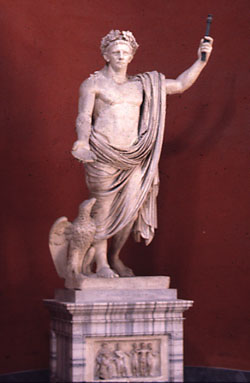Post by cruororism on Oct 11, 2003 9:18:10 GMT

March, 37 CE: At about 25 years old, Caligula was named Rome's third emperor, the first direct descendant of Augustus to take the throne (click here for a coin on which Caligula emphasizes this relationship). The reign began with good feelings all around, since Caligula declared an amnesty for all Romans imprisoned or exiled under Tiberius, posthumously restored honor to his mother and brothers, and stopped the treason trials, getting rid of the informers in the process. One month after his accession, his grandmother, Antonia, died.
October, 37 CE: Caligula fell seriously ill, with what was described at the time as a “brain fever”; there was great mourning in Rome, and much joy at his recovery. There were a number of freedmen in his close circle who attained considerable influence: Helicon, his chamberlain; Apelles, a tragic actor; and most wealthy and powerful of all, Callistus, a kind of imperial secretary.
38 CE: Early in the year, Caligula forced his father-in-law, Gaius Silanus, and young Gemellus, grandson of Tiberius, to commit suicide by accusing them of treasonable activities. Although the prefect of the Praetorian Guard, Macro, had been influential in helping Caligula secure the throne, the emperor apparently felt that Macro was becoming too powerful.
Caligula tricked Macro into believing that he was being made prefect of Egypt and then had him arrested and executed. Later in the year Caligula's favorite sister, Drusilla, died; he had been so close to her that there were rumors of incest. In the manner of the eastern monarchs, Caligula had Drusilla deified; she was the first Roman woman ever officially declared a deity, but her divinity did not survive his reign because he had so egregiously flouted Roman precedent (in contrast, when Claudius had Livia deified, he emphasized her role as “diva Augusta,” wife and mother of emperors). Caligula also minted coins in Drusilla's honor (scroll down on this page to see a coin featuring the three sisters of Caligula).
39 CE: Since the beginning of his reign Caligula had spent lavishly on public shows, games, and displays (sometimes even participating in them himself); in the most extravagant of these, he had hundreds of ships tied together to make a temporary floating bridge so that he could ride across the Bay of Naples on horseback.
By 39, the public treasury was near bankruptcy. Therefore, at the beginning of the year Caligula revived the treason trials that had become so unpopular under Tiberius; he also began other methods of raising public money, including the auctioning off of public properties left over from shows. Many of these revealed his strange sense of humor (e.g., at one of these auctions a senator fell asleep and Caligula took each of his nods as bids, selling him 13 gladiators for a huge sum).
In the words of historian Michael Grant, “Caligula had an irrepressible, bizarre sense of the ridiculous, deliberately designed to shock, but frequently taken by his alarmed subjects too seriously. Notoriously absurd traditions . . . such as the story that he intended to give a consulship to his favorite horse Incitatus no doubt originated from his continual stream of jokes. Probably he remarked that Incitatus would do the job as well as most of the recent incumbents; and meanwhile he ordered silence in the entire neighborhood, to prevent the horse from being disturbed” (The Twelve Caesars, [New York: Scribner, 1975], 113).
Some of his jokes were more sadistic, as when he arranged an oratory competition in which all the losers had to erase their wax tablets with their tongues. All these activities, as Grant points out, “meant that he had far less time available for governing the empire. Caligula, that is to say, became the first emperor to attempt this enormous task as a part-time job”


